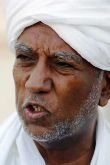Sudan to share oil wealth in 2005: official
KHARTOUM, Nov 1 (Reuters) – Sudan will implement a protocol dividing its oil riches between the north and south next year, whether or not there is a peace deal to end more than two decades of civil war in the south, the head of the ruling party said on Monday.
 Asked if the protocol would be implemented from next year with or without a peace deal, Ibrahim Ahmed Omar [photo] said: “Yes — starting from next year, the beginning of next year, from January with the new budget because we are convinced that this is what the people want.”
Asked if the protocol would be implemented from next year with or without a peace deal, Ibrahim Ahmed Omar [photo] said: “Yes — starting from next year, the beginning of next year, from January with the new budget because we are convinced that this is what the people want.”
The protocol gives roughly half Sudan’s oil wealth to the south of the country.
Sudan produces some 320,000 barrels per day of crude and hopes to boost this to more than 500,000 by next year as a new pipeline comes on stream. The two main oil fields are in the south, but the refineries and pipelines are in the north.
Omar was speaking after addressing about 90,000 southerners at the ruling party headquarters in Khartoum. About four million southerners have been displaced by the conflict.
The southern civil war has claimed more than two million lives, and broadly pits the Islamist government in Khartoum against the mainly Christian and animist south, complicated by issues of ideology, oil and ethnicity.
“When the peace deal comes it means that we start implementation,” Omar said. “Now we want to do a bit more than that. We want to do it from now. We want to give money and power to all the states of Sudan as from the beginning of this year (2005).”
First Vice-President Ali Osman Mohamed Taha should return to the southern peace talks in the Kenyan town of Naivasha in December, though no firm date had been set, Omar added.
Taha has been negotiating with the main southern rebel leader, John Garang, and both sides have said they hope to sign a final peace deal ending Africa’s longest civil war by the end of this year. The U.N. Security Council will meet in Nairobi later this month to express its support for a final agreement.
Omar, secretary-general of the ruling National Congress Party, which dominates government and parliament, said it was not clear if Taha would attend the Security Council meeting, but said it was “very likely” a southern peace deal would be signed by year end.
The more recent conflict in Sudan’s remote western Darfur region had delayed the talks, he said, adding he hoped it would not continue to do so.
